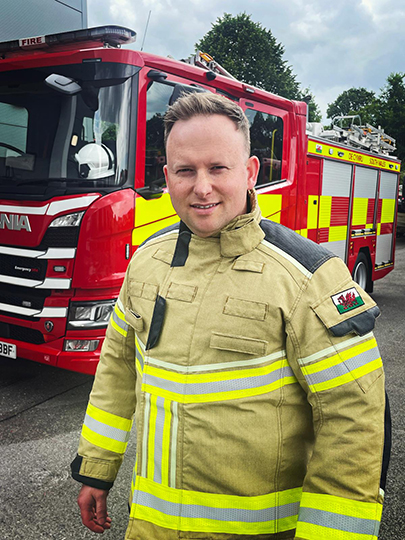South Wales Fire and Rescue's mission is "To make South Wales safer, by reducing risk"
Case Study: Mike Nash
At South Wales Fire and Rescue Service employees are recognised as the organisation’s most important asset. Regardless of role, all staff make a huge contribution to protecting the communities they serve, and this is reflected in the organisation’s mission which is “To make South Wales safer, by reducing risk”.
Mike Nash, Watch Manager for the Health, Safety and Wellbeing Team told us how several of his colleagues recently completed the NEBOSH Introduction to Incident Investigation Award, a one-day qualification that shows how non-complex incidents can be investigated effectively.

You have worked for South Wales Fire and Rescue Service for over 17 years. Can you tell us more about how your career has progressed during your time there?
My very first insight into South Wales Fire and Rescue Service came at 15 years of age when, as a Young Firefighter (now known as a Fire Cadet), I studied the role of an Operational Firefighter. In 2006 I became an On-call Firefighter working on the retained duty system. This was a part-time role providing operational cover within my local community including the preventative activities undertaken by firefighters.
In 2013, I joined our Fire Control team, answering emergency 999 calls, providing advice and guidance to callers, and mobilising Fire and Rescue assets whilst working closely with other agencies. After 2 years with Fire Control, I joined the wholetime duty system and completed a 12-week recruit training programme before being stationed at the Merthyr Tydfil Fire and Rescue Station. I was based at this station for a few years before transferring to Roath in Cardiff. I gained experience of different types of calls and all the additional specialist roles the Service has to offer during this period of my career.
In 2021, an opportunity came up to join our Operational Intelligence and Health, Safety and Wellbeing Teams. The role sat between the two teams and provided operational understanding and policy development.
What is your role now at South Wales Fire and Rescue Service? Can you tell us more about the sort of things you do day-to-day?
I currently work full-time in the Health, Safety and Wellbeing Team. My role is varied and includes activities such as risk assessment review, incident investigation, inspections, and general H&S guidance. The team meets regularly with colleagues from across the organisation to discuss the challenges faced and the innovations we aim to deliver to keep South Wales safe by reducing risk to colleagues and the public.
Why did you choose the NEBOSH Introduction to Incident Investigation Award in particular?
As a team we considered many different types of training of a similar nature, but it was important to maintain a level of continuity and a balanced approach to investigations. Having undertaken a level of scrutiny of the qualification’s syllabus, it was apparent that this option would suit individuals with some or no experience in this area and provided a healthy foundation for future investigations.
How did you select which staff participated in the course and how many participated?
The investigation process we have in place relies on an investigation officer or team being appointed. These will be made up of colleagues who are at Station and Group Manager level who are supported by the Health, Safety and Wellbeing team. We identified that it was this group who require the training. Eighteen personnel have completed the course so far, with some awaiting the outcome of their assessment. We plan to arrange additional courses in the future, some of these will be classroom based and others will be online.
Did the participants find the course, which was delivered by NEBOSH Gold learning partner Compassa Ltd, informative, and enjoyable?
Yes, the course was delivered in a very engaging and interactive way which suited all learning needs. The very nature of the subject isn’t always welcomed by all, but it was important to maintain the groups engagement and invite them to interact.
How has offering this qualification benefited your organisation so far?
Even though it is still early, we can see the benefits of rolling out an accredited qualification, which provides a national standard to incident investigation to both our near-miss and accident reporting. We were also able to adapt internal processes and procedures as a result of this learning.
What do you enjoy most about being a health and safety professional?
I don’t see myself as a health and safety professional, I’m a firefighter, but by the very nature of the role and organisation we aim to ensure our colleagues and communities are safe and healthy. However, working within this team gives me a great amount of pride in engaging with others and making a real difference to the health and safety culture across the organisation.
What would be your advice be to anyone at the start of their health and safety career?
Don’t be afraid to ask questions, respectfully challenging and thinking differently is how we evolve.
Do you have any hints and tips you can share with others who have the same aspiration for their business and employees?
Inspire and influence others to protect the future through innovation and engagement activities.
